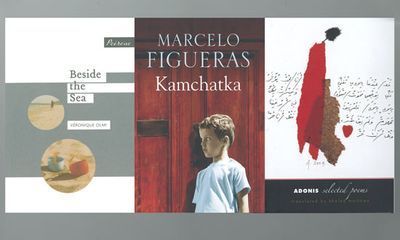Lost in Translation
By THEA LENARDUZZI
The revolving doors at Kings Place, London N1, were put to the test last night with around 200 people pirouetting or hurtling in from the cold for the award ceremony of the Translation Prizes 2011. Sponsored by the TLS, as it has been for many years, the night was a welcome reminder of the importance of reading books in translation, but also those perpetually under-sung literary heroes, the translators.
I came from just around the corner for the event; others had travelled much further to collect their prizes and take a bow, or to hear the winners read extracts from their books. First was Khaled Mattawa, straight off the plane from Tripoli, to accept the Saif Ghobash-Banipal prize for his translation of the Selected Poems of Adonis. His reading – "I add height and depth but how do I find my way . . . how do I find my direction . . . . And what do you want from me, son, O son?" – set the theme, crystallizing the web of dependence that links writers, translators and readers, even as a need for independence of voice might spin them in a different direction. Adriana Hunter, reading from her winning translation of Beside the Sea by Véronique Olmi, provided what seems a fitting coda to Adonis's/Mattawa's dilemma: a troubled single mother and her two young sons are climbing the six flights of stairs to their hotel room, "Perhaps if there had been more light we'd have felt more like it".
After the readings, Sean O'Brien stepped onto the stage to deliver the Sebald Lecture, being sure first to thank the stage management for their "delicate work" in rearranging the furniture to introduce a Parkinson-esque set of chairs and coffee table, and then point out an essential re-arrangement of his lecture title: "Making the Crossing: The poet as translator" should be "Making the Crossing: A poet as translator"; "I have nothing to say by way of theory of translation, only my own experience".
And O'Brien's experiences are certainly varied, careering from adolescent readings of Rilke in a (poor) translation, to producing his own version of Dante's Commedia (stemming, as I understood it, from some sort of dare by Don Paterson); a verse translation of Aristophanes' The Birds (to tie in with a production by the National Theatre in 2003); and Postcards from the High Seas by the Creole poet Corsino Fortes. Now, he is turning his attention to the Spanish Golden Age and the work of Pedro Calderón, written entirely in rhyme, with seven different varieties of verse and enough "bravura" to send many a translator running for the stage door.
With all of these, the challenge is to navigate between two sorts of translation: "faithful but uninteresting" and "interesting but unfaithful" (that push and pull between dependence and independence, again). For some endeavours, "accuracy is everything", for others it can be left below deck or on land. Translation is unavoidably and necessarily "an impure art". The task of translating a poem and producing something that is self-buoying rather than tied with ropes and notes to the original is likely to induce sea-sickness in many. O'Brien, for example, "can get by" in French and German but is eager to begin a project on Lithuanian poetry. What if you get it wrong? What if you miss the point? "So shoot me", he says . . . .
It strikes me that sitting at the back of the large, church-like auditorium in the basement of Kings Place is in some small way similar to the anxious experience of translating. I can't make out every word, I'm petrified I'll miss the "most important part", I have no way of checking where line breaks are or of double-checking quotes (I scanned Adonis's poems this morning for the "son, O, son" that I felt sure my eye would spot, but did not). But there is some comfort in O'Brien's lines on the necessity of translations: "If you want a thing to live, you carry report of it". As O'Brien said, channelling the actor Harrison Ford "You can type this shit but you can't say it", or, in my case, "you can say it, but I can't type it." Reporting, like translating, is a form of interpretation. So shoot me.
Peter Stothard's Blog
- Peter Stothard's profile
- 30 followers




